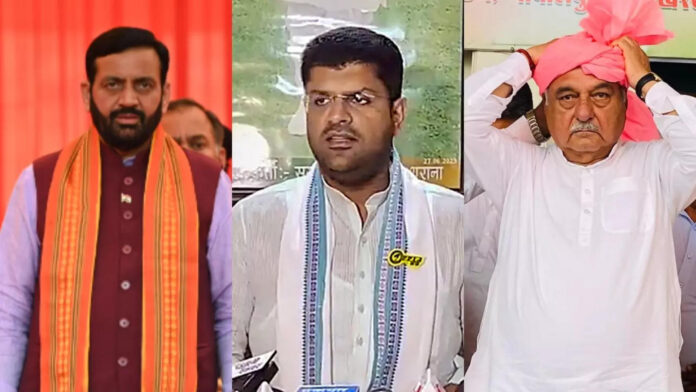Disillusionment with the BJP is evident particularly in cities along the G.T. Road belt like Panipat, Sonipat, Karnal and Ambala
Shailendra Gautam
Chandigarh : The political landscape in Haryana is undergoing a seismic shift, as the Bharatiya Janata Party (BJP) grapples with a wave of discontent and defections. On September 8, G.L. Sharma, the vice-president of the Haryana BJP, announced his resignation, a move that was soon followed by over 250 other officials who switched allegiance to the Congress. This exodus marks the fifth consecutive day of mass resignations from the BJP, which have included state cabinet ministers, sitting MLAs, and influential leaders at both state and district levels.
The catalyst for this upheaval was the BJP’s release of its first list of 67 candidates for the upcoming Assembly elections on September 4. The announcement sparked internal revolts within the party, highlighting deep-seated dissatisfaction with party leadership and growing concerns about the BJP’s electoral prospects. However, the unrest within the party had been brewing long before the release of this list, driven by a series of grievances regarding the party’s leadership and its apparent faltering momentum.
Historically, the BJP has struggled to establish a dominant presence in Haryana. In the state’s inaugural Assembly election of 1967, the Bharatiya Jana Sangh, the BJP’s predecessor, secured only 12 out of 81 seats. As Haryana’s farming community gained influence, the BJP’s seat count generally remained in single digits, with occasional alliances formed to consolidate opposition votes. It was not until the 2014 elections that the BJP made a notable breakthrough, riding the so-called ‘Modi wave’ and forming what was termed an anti-Jat alliance at the state level.
This strategy aimed to unite Banias, Punjabis, and backward castes to counterbalance the Jat population, which the BJP perceived as a major voting bloc. Despite initial success, this alliance strategy had its limitations in Haryana’s closely-knit society. Traditionally, the Dalit and backward communities in Haryana had been aligned with the Congress, which had managed to build a broad-based coalition over time. The BJP’s attempts to break into this voter base through defections and alliances had limited success, even though it did manage to attract some prominent figures like Rao Indrajit Singh to win over Ahir voters.
The 2014 Assembly elections saw the BJP narrowly securing a majority, largely due to a combination of anti-incumbency sentiment against the Congress, which had been in power for a decade, and the absence of prominent opposition leader Om Prakash Chautala, who was jailed over a recruitment scam. The BJP capitalized on these circumstances, but the subsequent 2019 Assembly elections presented new challenges. Om Prakash Chautala’s grandson, Dushyant Chautala, launched the Jannayak Janata Party (JJP), which split the anti-BJP vote and led to a hung assembly. The BJP’s response was to employ ‘Operation Kamal’, offering Chautala the deputy chief minister position to secure a coalition government.
The next five years under the BJP’s rule were marked by significant challenges, including the COVID-19 pandemic and widespread farmers’ protests. The BJP’s handling of the farmers’ protests, which involved barricading Delhi’s borders and confronting the protestors, alienated not only the Jats but also other farming communities. This created a hostile environment for BJP leaders, who faced difficulties in holding public meetings or participating in events due to widespread farmer opposition.
As the 2024 Lok Sabha elections approached, the BJP attempted to address the growing discontent by replacing Chief Minister Manohar Lal Khattar with Nayab Singh Saini, an OBC leader, in a bid to counter anti-incumbency and appeal to the Other Backward Classes (OBCs). Despite this strategy, the Lok Sabha results indicated that the party’s efforts were not successful in shifting voter sentiment.
Disillusionment with the BJP is particularly pronounced in cities along the G.T. Road belt, including Panipat, Sonipat, Karnal, and Ambala. These urban centers, once considered strongholds of BJP support, are witnessing a shift in loyalties. Reports suggest that the BJP is struggling to maintain its base among city dwellers and traditional supporters from the Punjabi and Vaish communities, who were once crucial to its electoral success.
The BJP’s carefully constructed caste-based alliances have begun to unravel, exposing the party to a more volatile political landscape. The erosion of these alliances has significantly undermined the BJP’s influence in Haryana, leaving it in a precarious position as it attempts to regain the trust of communities that once played a pivotal role in its success.
In this tumultuous environment, individual political careers are also in flux. For instance, Vinesh Phogat, a prominent wrestler, is contesting the upcoming Assembly elections from the Julana seat on a Congress ticket. Her candidacy has drawn attention not only because of her popularity but also due to the political maneuvering involved. Phogat faced challenges with her resignation from Indian Railways, which initially delayed her ability to contest. However, the urgency of her candidacy and the broader political implications likely influenced the swift resolution of her resignation process.
Similarly, Sunil Sangwan, an ex-jailor who received a BJP ticket for the Dadri constituency, opted for voluntary retirement from his position as Bhondsi Jail superintendent. This move, expedited under political pressure, reflects the complexities and strategic maneuvers often involved in the political sphere.
As Haryana navigates this period of political upheaval, the BJP’s struggle to maintain its foothold in the state serves as a reflection of broader challenges facing the party. The crumbling of caste alliances and the wave of defections highlight the difficulties the BJP faces in adapting to changing political dynamics and voter sentiment. The coming months will be crucial in determining whether the BJP can regain its footing or if the growing discontent will reshape Haryana’s political landscape.


